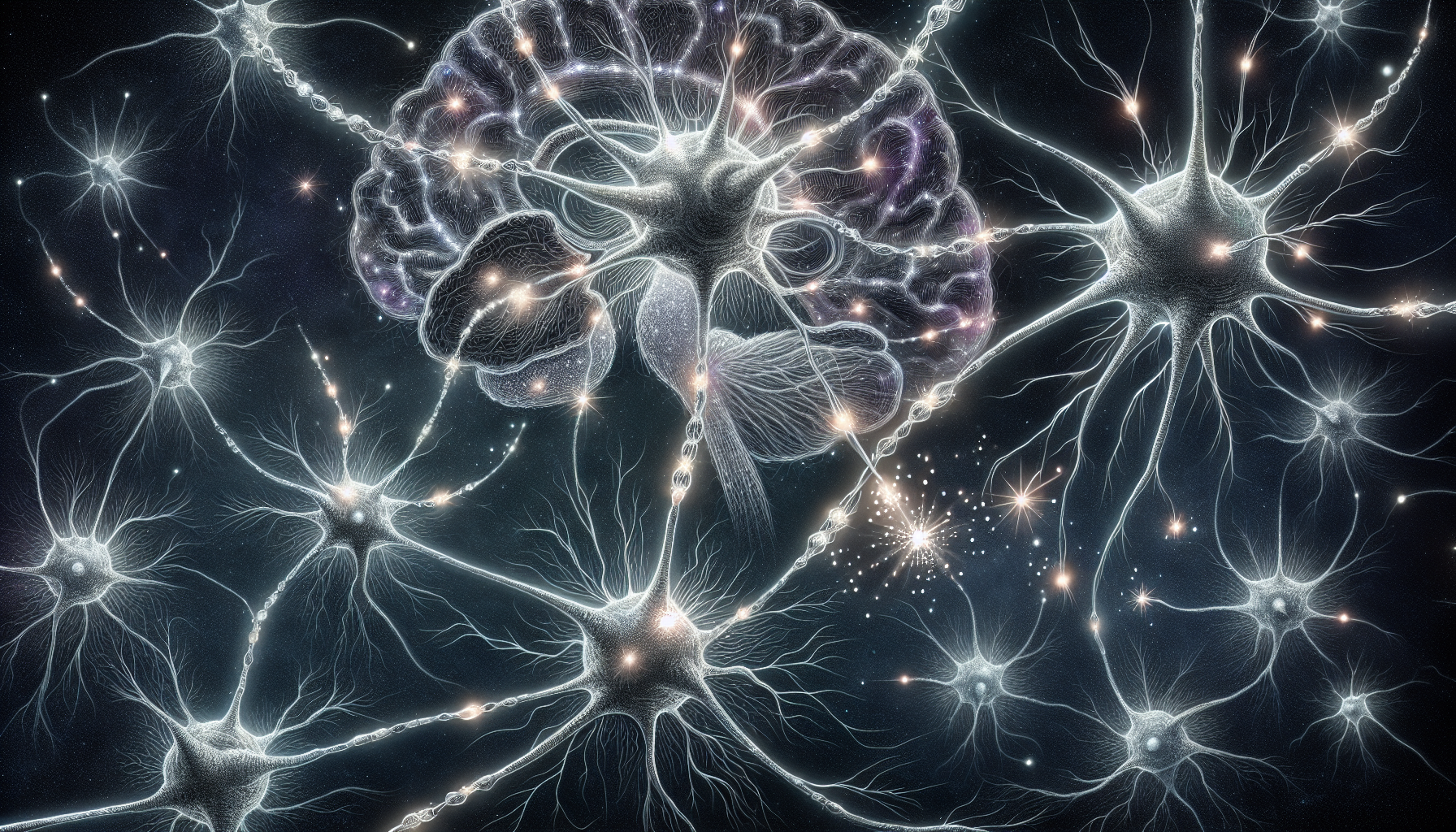Discover How Magnesium and Brain Health Are Connected
Magnesium is pivotal for brain health and essential for optimal cognitive function, particularly because it plays a significant role in ATP production, a process critical for energy production within the brain.
This aspect of brain health magnesium is crucial as it serves as a protector of the brain against inflammation and deterioration, influencing various aspects, such as memory preservation and stress regulation.
We will delve into the complex roles magnesium plays in relation to the brain, investigate the consequences of insufficient magnesium levels, and offer practical guidance on how to sustain adequate magnesium levels to foster proper brain functionality.
 Magnesium, commonly hailed as a mineral powerhouse, is critical for maintaining peak brain performance.
This essential nutrient helps transmit nerve signals and preserves the balance of ions within our neural system, which are key to brain health. But what specific mechanisms does it engage in?
Consider this analogy: Magnesium acts like the level-headed individual at an unruly party who intervenes to restore order.
It moderates neuronal activity by managing calcium flow into cells and halting its release from where it’s stored internally.
In essence, magnesium ensures that our brain cells don’t become overly stimulated—an event that could lead to their demise.
Magnesium plays a role in generating energy for the brain thereby supporting smooth cognitive operations. We’ll delve deeper into this aspect later on.
Magnesium, commonly hailed as a mineral powerhouse, is critical for maintaining peak brain performance.
This essential nutrient helps transmit nerve signals and preserves the balance of ions within our neural system, which are key to brain health. But what specific mechanisms does it engage in?
Consider this analogy: Magnesium acts like the level-headed individual at an unruly party who intervenes to restore order.
It moderates neuronal activity by managing calcium flow into cells and halting its release from where it’s stored internally.
In essence, magnesium ensures that our brain cells don’t become overly stimulated—an event that could lead to their demise.
Magnesium plays a role in generating energy for the brain thereby supporting smooth cognitive operations. We’ll delve deeper into this aspect later on.
 All cells, including those in our brain, are vulnerable to damage as time progresses.
Magnesium plays a pivotal role in safeguarding our brain cells from the impacts of oxidative stress and inflammation.
Magnesium acts to shield neurons by impeding the discharge of molecules that cause vasodilation, thus keeping our brain cells robust and operative.
An increased consumption of magnesium diminishes cerebral inflammation, which is essential for preserving the blood-brain barrier’s integrity.
Evidently, magnesium transcends being an auxiliary element. It emerges as a key factor in promoting better brain health.
All cells, including those in our brain, are vulnerable to damage as time progresses.
Magnesium plays a pivotal role in safeguarding our brain cells from the impacts of oxidative stress and inflammation.
Magnesium acts to shield neurons by impeding the discharge of molecules that cause vasodilation, thus keeping our brain cells robust and operative.
An increased consumption of magnesium diminishes cerebral inflammation, which is essential for preserving the blood-brain barrier’s integrity.
Evidently, magnesium transcends being an auxiliary element. It emerges as a key factor in promoting better brain health.
 Recognizing a magnesium deficiency can be complex, given that the symptoms manifest both physically and psychologically.
Common physical indicators of low magnesium might include disturbances in sleep, difficulty with bowel movements, persistent headaches, an overwhelming sense of tiredness, general weakness as well as muscle cramps.
The presence of these issues could suggest that there is not enough magnesium within the body.
To the physical signs mentioned above, psychological indications such as feelings of anxiety or irritability may occur alongside restlessness.
An affected individual might also experience difficulties focusing and feel fatigued mentally – all potential signals pointing towards deficient levels of magnesium.
If you notice any combination of these effects afflicting you, it would likely be beneficial for your health to consider increasing your intake of this critical nutrient.
Recognizing a magnesium deficiency can be complex, given that the symptoms manifest both physically and psychologically.
Common physical indicators of low magnesium might include disturbances in sleep, difficulty with bowel movements, persistent headaches, an overwhelming sense of tiredness, general weakness as well as muscle cramps.
The presence of these issues could suggest that there is not enough magnesium within the body.
To the physical signs mentioned above, psychological indications such as feelings of anxiety or irritability may occur alongside restlessness.
An affected individual might also experience difficulties focusing and feel fatigued mentally – all potential signals pointing towards deficient levels of magnesium.
If you notice any combination of these effects afflicting you, it would likely be beneficial for your health to consider increasing your intake of this critical nutrient.
 Maintaining brain health through magnesium can best be achieved by consuming a nutritious diet, rather than relying solely on supplements.
It has been observed that diets rich in magnesium, with an intake exceeding 550 milligrams per day, are associated with greater brain volumes.
This dietary approach may contribute to having a brain that is comparably younger by one year at the age of 55, particularly for women.
Studies have shown that a high dietary magnesium intake is linked to larger brain volumes, smaller white matter lesions, and neuroprotective effects, especially in women and post-menopausal women.
Furthermore, a higher dietary magnesium intake could improve brain health, preserve cognitive ability, lower dementia risk, and is associated with less age-related brain shrinkage.
There’s a variety of foods available from which we can derive our daily dose of magnesium:
Maintaining brain health through magnesium can best be achieved by consuming a nutritious diet, rather than relying solely on supplements.
It has been observed that diets rich in magnesium, with an intake exceeding 550 milligrams per day, are associated with greater brain volumes.
This dietary approach may contribute to having a brain that is comparably younger by one year at the age of 55, particularly for women.
Studies have shown that a high dietary magnesium intake is linked to larger brain volumes, smaller white matter lesions, and neuroprotective effects, especially in women and post-menopausal women.
Furthermore, a higher dietary magnesium intake could improve brain health, preserve cognitive ability, lower dementia risk, and is associated with less age-related brain shrinkage.
There’s a variety of foods available from which we can derive our daily dose of magnesium:
 Increasing magnesium intake has been proven to have a beneficial impact on blood pressure.
Research indicates that an uptick in magnesium consumption can decrease systolic blood pressure by two points and diastolic pressure by 1.7 points, which is particularly effective when coupled with higher potassium levels and lower sodium intake—this combination may match the efficacy of one antihypertensive drug.
Magnesium plays a crucial role in bone health as it aids in the structural development of bones.
This mineral isn’t just vital for cognitive function. Its importance extends to our overall physical well-being too.
Increasing magnesium intake has been proven to have a beneficial impact on blood pressure.
Research indicates that an uptick in magnesium consumption can decrease systolic blood pressure by two points and diastolic pressure by 1.7 points, which is particularly effective when coupled with higher potassium levels and lower sodium intake—this combination may match the efficacy of one antihypertensive drug.
Magnesium plays a crucial role in bone health as it aids in the structural development of bones.
This mineral isn’t just vital for cognitive function. Its importance extends to our overall physical well-being too.

Key Takeaways
- Magnesium is key for brain function, helping regulate neurotransmitters and protect brain cells from damage, while influencing stress responses and memory retention.
- A significant portion of the U.S. population is magnesium deficient, which can manifest through a variety of psychological and physical symptoms and contribute to neurodegenerative conditions.
- Magnesium supplements can offer cognitive benefits, but it’s crucial to choose the right type and consult a doctor to avoid over-supplementation and potential interactions with medications.
The Essential Role of Magnesium in Cognitive Health
 Magnesium, commonly hailed as a mineral powerhouse, is critical for maintaining peak brain performance.
This essential nutrient helps transmit nerve signals and preserves the balance of ions within our neural system, which are key to brain health. But what specific mechanisms does it engage in?
Consider this analogy: Magnesium acts like the level-headed individual at an unruly party who intervenes to restore order.
It moderates neuronal activity by managing calcium flow into cells and halting its release from where it’s stored internally.
In essence, magnesium ensures that our brain cells don’t become overly stimulated—an event that could lead to their demise.
Magnesium plays a role in generating energy for the brain thereby supporting smooth cognitive operations. We’ll delve deeper into this aspect later on.
Magnesium, commonly hailed as a mineral powerhouse, is critical for maintaining peak brain performance.
This essential nutrient helps transmit nerve signals and preserves the balance of ions within our neural system, which are key to brain health. But what specific mechanisms does it engage in?
Consider this analogy: Magnesium acts like the level-headed individual at an unruly party who intervenes to restore order.
It moderates neuronal activity by managing calcium flow into cells and halting its release from where it’s stored internally.
In essence, magnesium ensures that our brain cells don’t become overly stimulated—an event that could lead to their demise.
Magnesium plays a role in generating energy for the brain thereby supporting smooth cognitive operations. We’ll delve deeper into this aspect later on.
Magnesium’s Influence on Neurotransmitters
The complex web of neurons in our brains relies on chemicals known as neurotransmitters to communicate. These vital substances control mood, manage stress responses, and oversee cognitive functions. At the heart of this process is magnesium, which plays a key role in the modulation of these activities. Magnesium contributes to several advantages for mental health such as:- Serving as an anti-stress agent by limiting the release of hormones associated with stress and blocking their access into the brain.
- Providing a soothing influence, particularly through magnesium glycinate that aids in managing issues like anxiety, depression, and sleep disorders.
- Assisting in establishing essential components for our neural communication pathways during initial neurological development.
- Having a significant function from early neural growth stages to alleviating stress and balancing emotions.
Shielding Brain Cells from Damage
 All cells, including those in our brain, are vulnerable to damage as time progresses.
Magnesium plays a pivotal role in safeguarding our brain cells from the impacts of oxidative stress and inflammation.
Magnesium acts to shield neurons by impeding the discharge of molecules that cause vasodilation, thus keeping our brain cells robust and operative.
An increased consumption of magnesium diminishes cerebral inflammation, which is essential for preserving the blood-brain barrier’s integrity.
Evidently, magnesium transcends being an auxiliary element. It emerges as a key factor in promoting better brain health.
All cells, including those in our brain, are vulnerable to damage as time progresses.
Magnesium plays a pivotal role in safeguarding our brain cells from the impacts of oxidative stress and inflammation.
Magnesium acts to shield neurons by impeding the discharge of molecules that cause vasodilation, thus keeping our brain cells robust and operative.
An increased consumption of magnesium diminishes cerebral inflammation, which is essential for preserving the blood-brain barrier’s integrity.
Evidently, magnesium transcends being an auxiliary element. It emerges as a key factor in promoting better brain health.
Magnesium and Memory Retention
The process of aging often leads to challenges in memory retention and recall. Interestingly, the level of magnesium we consume in our diet might have a considerable impact on these cognitive abilities. Studies have found an association between greater dietary magnesium intake and a reduced likelihood of developing dementia, indicating potential advantages for preserving mental acuity and brain health. Experiments with animal subjects also suggest that boosting high dietary magnesium levels can improve neural plasticity—essential for creating lasting memories. Enhancements in synaptic flexibility are correlated with increased amounts of magnesium in the brain, underscoring the critical role that this mineral plays in bolstering our learning and memory skills.The Hidden Epidemic: Magnesium Deficiency and Its Impact
Considering the significant role magnesium plays in maintaining brain health, it would seem logical that our diets should sufficiently provide this essential mineral. Unfortunately, that is far from the case. A common public health concern is magnesium deficiency. Approximately half of the population in the United States does not consume the recommended average daily intake of magnesium necessary for optimal brain function. Understanding the average daily magnesium intake is crucial in analyzing how much magnesium individuals consume daily, which directly correlates with brain health and adheres to the recommended daily allowance of magnesium. The widespread shortfall in this vital nutrient can be attributed to factors such as diminished soil quality, processed food consumption, and pharmaceutical use. The lack of sufficient magnesium can have dire effects on cognitive well-being because its scarcity has been associated with inflammation within neural tissue and subsequent neuronal deterioration. How then do we spot signs of a shortage in magnesium levels, and who might be more at risk for developing such a deficit?Recognizing the Signs of Low Magnesium
 Recognizing a magnesium deficiency can be complex, given that the symptoms manifest both physically and psychologically.
Common physical indicators of low magnesium might include disturbances in sleep, difficulty with bowel movements, persistent headaches, an overwhelming sense of tiredness, general weakness as well as muscle cramps.
The presence of these issues could suggest that there is not enough magnesium within the body.
To the physical signs mentioned above, psychological indications such as feelings of anxiety or irritability may occur alongside restlessness.
An affected individual might also experience difficulties focusing and feel fatigued mentally – all potential signals pointing towards deficient levels of magnesium.
If you notice any combination of these effects afflicting you, it would likely be beneficial for your health to consider increasing your intake of this critical nutrient.
Recognizing a magnesium deficiency can be complex, given that the symptoms manifest both physically and psychologically.
Common physical indicators of low magnesium might include disturbances in sleep, difficulty with bowel movements, persistent headaches, an overwhelming sense of tiredness, general weakness as well as muscle cramps.
The presence of these issues could suggest that there is not enough magnesium within the body.
To the physical signs mentioned above, psychological indications such as feelings of anxiety or irritability may occur alongside restlessness.
An affected individual might also experience difficulties focusing and feel fatigued mentally – all potential signals pointing towards deficient levels of magnesium.
If you notice any combination of these effects afflicting you, it would likely be beneficial for your health to consider increasing your intake of this critical nutrient.
Risk Factors for Magnesium Deficiency
Many individuals are at risk for magnesium deficiency due to a variety of contributors. Notably, roughly half the population in the United States falls short in consuming enough foods that are rich in magnesium, failing to meet daily requirements. Alcohol addiction and various health issues such as type 2 diabetes or Crohn’s disease can exacerbate this problem. Prolonged intake of certain medications may lead to a decrease in magnesium levels. Recognizing these contributing factors is crucial for preemptive measures against developing a deficiency of magnesium.Magnesium Supplementation: A Path to Enhanced Brain Function?
Given the significant function magnesium serves in maintaining brain health and its common insufficiency, it is reasonable to consider that taking magnesium supplements could be an effective strategy. Magnesium is vitally important for energy generation in the brain, which consumes a full 20 percent of the body’s total energy output despite its smaller size relative to overall body mass. Does supplementing with dietary magnesium represent the optimal approach for enhancing brain health or are there potential negative consequences? We will delve into existing research, review different forms of magnesium supplements available on the market, and address possible risks associated with excessive supplementation.Evaluating the Evidence
Magnesium supplementation holds compelling possibilities for enhancing brain health. Observations indicate that children with ADHD who receive magnesium supplements demonstrate betterment in conduct, reduced impulsivity, and diminished hyperactivity. Individuals suffering from depression have experienced elevated levels of serum brain-derived neurotrophic factor—a key player in neuronal plasticity—following magnesium supplementation. There is also research to suggest that dietary intake of magnesium could significantly affect migraine symptoms. The body of evidence supporting this claim remains small at present. Consequently, although initial findings are encouraging regarding the role of magnesium in treating cognitive disorders, comprehensive studies are still required to definitively ascertain its effects.Types of Magnesium Supplements
The market is filled with various magnesium supplements, yet their efficacy isn’t uniform. Certain types of magnesium have a greater bioavailability and are more beneficial for maintaining brain health. For instance, the form known as magnesium glycinate stands out due to its high bioavailability, which makes it an excellent choice for promoting brain health. Alternatively, magnesium lactate is recognized for its easy absorption and is easier on the digestive system – this can be advantageous when taking higher doses or if one has sensitivities to other forms. Magnesium sulfate should also be taken into account among these options. Specifically targeting enhanced brain plasticity? Magnesium L-threonate emerges as the superior form of a magnesium supplement tailored for this purpose. Selecting an appropriate version of a magnesium supplement is crucial in optimizing its positive impact on brain health.Advantages of a Full-Spectrum Magnesium Supplement for Brain Health and Overall Wellness
When it comes to supporting brain health and overall well-being, not all magnesium supplements are created equal. While single-form magnesium supplements, such as magnesium L-threonate or magnesium glycinate, can provide some benefits, a full-spectrum magnesium supplement offers a more comprehensive approach. By combining various forms of magnesium, along with complementary nutrients like vitamin B6 and manganese, a full-spectrum supplement can target multiple aspects of health, including:- brain function,
- mood,
- sleep,
- muscle recovery,
- and cardiovascular health.
- Magnesium glycinate has been shown to support sleep quality, reduce anxiety, and promote brain health.
- Magnesium malate plays a crucial role in maintaining a healthy brain and nervous system.
- Magnesium aspartate has been linked to improvements in mood, anxiety, and depression.
- Magnesium taurate can help relax and calm the nerves while supporting healthy blood pressure levels.
When More Isn’t Better
While magnesium supplementation offers appealing advantages, it’s important to recognize the potential for adverse effects when consumed in excess. An overabundance of nutrients like magnesium may cause detrimental symptoms including:- weakened muscles,
- tiredness,
- reduced blood pressure,
- difficulty breathing,
- and, in severe situations, could be fatal.
Dietary Routes to Boosting Brain Magnesium
 Maintaining brain health through magnesium can best be achieved by consuming a nutritious diet, rather than relying solely on supplements.
It has been observed that diets rich in magnesium, with an intake exceeding 550 milligrams per day, are associated with greater brain volumes.
This dietary approach may contribute to having a brain that is comparably younger by one year at the age of 55, particularly for women.
Studies have shown that a high dietary magnesium intake is linked to larger brain volumes, smaller white matter lesions, and neuroprotective effects, especially in women and post-menopausal women.
Furthermore, a higher dietary magnesium intake could improve brain health, preserve cognitive ability, lower dementia risk, and is associated with less age-related brain shrinkage.
There’s a variety of foods available from which we can derive our daily dose of magnesium:
Maintaining brain health through magnesium can best be achieved by consuming a nutritious diet, rather than relying solely on supplements.
It has been observed that diets rich in magnesium, with an intake exceeding 550 milligrams per day, are associated with greater brain volumes.
This dietary approach may contribute to having a brain that is comparably younger by one year at the age of 55, particularly for women.
Studies have shown that a high dietary magnesium intake is linked to larger brain volumes, smaller white matter lesions, and neuroprotective effects, especially in women and post-menopausal women.
Furthermore, a higher dietary magnesium intake could improve brain health, preserve cognitive ability, lower dementia risk, and is associated with less age-related brain shrinkage.
There’s a variety of foods available from which we can derive our daily dose of magnesium:
- Dark chocolate,
- Nuts,
- Whole grains,
- Legumes,
- Fruits.
- Vegetables
Nuts, Seeds, and Leafy Greens
In the quest to enhance your brain health through diet, prioritize nuts and seeds for their high magnesium content. Almonds, cashews, and Brazil nuts stand out in this regard. For instance, just one ounce of cashews boasts 83 mg of magnesium. Do not overlook leafy green vegetables as they are abundant with magnesium alongside a wealth of vital nutrients including vitamins A, C, K, as well as iron and manganese. These greens truly represent superfoods that support both cognitive function and general wellness. When organizing your dietary plans, ensure these nutrient-dense options are included to harness their benefits fully.The Impact of Cooking and Processing
Incorporating foods abundant in magnesium into our daily meals is essential, but it’s just as critical to recognize that their nutritional value can be affected by cooking and processing techniques. High heat or water-based cooking methods may reduce the magnesium content of vegetables by approximately 60-70%. To mitigate the reduction of this crucial nutrient, employing minimal amounts of water for steaming rather than soaking or boiling is advisable. Preserving nutrients like magnesium can also be achieved through quicker cooking methods such as steaming or microwaving. The method we employ to cook has a substantial effect on preserving the nutrient quality derived from our food.Magnesium’s Broad-Spectrum Benefits for Whole-Body Wellness
Magnesium, the body’s fourth most abundant mineral, plays a crucial role in various biological processes. This essential nutrient not only contributes to optimal brain health, but also is important for maintaining normal blood pressure levels, reducing the risk of stroke, and supporting bone development—highlighting its importance for comprehensive health maintenance. Aside from enhancing cognitive function, magnesium promotes general physical well-being. Its superior absorbability—especially as magnesium malate—is particularly advantageous for managing chronic conditions such as fibromyalgia.From Blood Pressure to Bone Health
 Increasing magnesium intake has been proven to have a beneficial impact on blood pressure.
Research indicates that an uptick in magnesium consumption can decrease systolic blood pressure by two points and diastolic pressure by 1.7 points, which is particularly effective when coupled with higher potassium levels and lower sodium intake—this combination may match the efficacy of one antihypertensive drug.
Magnesium plays a crucial role in bone health as it aids in the structural development of bones.
This mineral isn’t just vital for cognitive function. Its importance extends to our overall physical well-being too.
Increasing magnesium intake has been proven to have a beneficial impact on blood pressure.
Research indicates that an uptick in magnesium consumption can decrease systolic blood pressure by two points and diastolic pressure by 1.7 points, which is particularly effective when coupled with higher potassium levels and lower sodium intake—this combination may match the efficacy of one antihypertensive drug.
Magnesium plays a crucial role in bone health as it aids in the structural development of bones.
This mineral isn’t just vital for cognitive function. Its importance extends to our overall physical well-being too.
Magnesium and Cardiovascular Disease
The significance of magnesium in maintaining cardiovascular health cannot be overstated, as it is instrumental in:- Promoting stable blood pressure levels,
- Lowering the potential for atherosclerosis development,
- Ensuring regular heartbeats,
- Contributing to energy generation within the cardiac muscle.
Navigating the Complexities of Magnesium and Medication Interactions
Magnesium supplements offer a convenient solution to boost our magnesium levels, yet it’s important to consider that they can interfere with various drugs. This interference may impair the absorption and potency of certain medicines, including antibiotics, bisphosphonates, and calcium channel blockers employed in managing high blood pressure. Consequently, before starting on magnesium supplements, it is crucial to seek advice from your healthcare provider. Doing so will help avoid any possible conflicts with medications you are already taking. We’ll explore this issue further.Common Medications That May Interfere with Magnesium
Numerous drugs have the potential to disrupt the magnesium balance in our bodies. For example, diuretics might induce a deficiency in magnesium by impacting its uptake or by accelerating its expulsion from the body. Simultaneously ingesting magnesium supplements can also hinder how well certain antibiotics like ciprofloxacin and levofloxacin are absorbed. Muscle issues could arise if aminoglycoside antibiotics are administered along with injections of magnesium. Careful monitoring of your magnesium levels is essential when you’re on any such medications so that adjustments to your intake can be made as needed.Balancing Supplemental Magnesium with Other Treatments
It’s crucial to exercise care when combining magnesium supplements with other forms of treatment, and this should be done under the guidance of a medical professional. Those taking medications for high blood pressure like calcium channel blockers need to be particularly vigilant as concurrent use with magnesium supplementation might result in overly lowered blood pressure. Patients managing hypertension or diabetes are advised to cautiously regulate their intake of magnesium supplements due to possible interactions with their existing prescription drugs. Because magnesium has properties that can thin the blood, there is an elevated risk of bleeding when it is taken alongside medications designed to impede blood clotting.Summary
We’ve journeyed through the world of magnesium, discovering its essential role in our brain health and cognitive function, the widespread deficiency of this vital nutrient, and the potential benefits and risks of supplementation. We’ve also explored the dietary sources of magnesium and how cooking methods can impact its levels. Finally, we delved into the broader benefits of magnesium for whole-body wellness and its interactions with certain medications. Remember, while magnesium is a powerful ally in maintaining our brain health, it’s important to balance its intake with a well-rounded diet and to consult with a healthcare provider before turning to supplements. So, are you ready to embrace the miracle mineral for a sharper, more focused mind? Learn more about magnesium nutrition and brain health here!Frequently Asked Questions
What are some of the signs of low magnesium?
Should you be suffering from sleep disturbances, constipation, headaches, a sense of fatigue and weakness, muscle cramps, anxiety or irritability, restlessness or finding it difficult to concentrate—these symptoms might indicate that your magnesium levels are lower than they should be. It is essential to seek the guidance of a medical expert for an accurate evaluation and recommendations regarding this matter.Can cooking methods affect the magnesium content of foods?
Indeed, when vegetables are cooked using methods that involve high heat or water, there is a notable reduction in their nutrient content. Specifically, the amount of magnesium can be reduced by as much as 60-70%. It’s crucial to select cooking techniques thoughtfully if one wishes to preserve the levels of magnesium present in food items.Can magnesium supplements interact with certain medications?
Indeed, magnesium supplements may affect the way certain drugs work, especially by decreasing the absorption and efficacy of medications such as antibiotics, bisphosphonates, and calcium channel blockers, which are prescribed for managing high blood pressure. Exercise caution when using these supplements concurrently with aforementioned medications.What are some magnesium-rich foods?
To enhance your magnesium intake, incorporate foods like almonds, cashews, and Brazil nuts into your diet. Consuming dark chocolate, whole grains, legumes, fruits and vegetables can contribute to this goal. In order to elevate your magnesium levels while ensuring a balanced diet plan is sustained, integrate these nutritious items into various meals throughout the day.Can magnesium supplementation cause any adverse effects?
Yes, excessive magnesium intake can cause muscle weakness, fatigue, low blood pressure, breathlessness, and, in severe cases, death. Be mindful of your magnesium intake.Magnesium deficiency is linked to stress, diabetes, heart disease, osteoporosis, chronic fatigue syndrome, depression, anxiety, trouble sleeping, sore muscles, migraines, and many more debilitating health conditions.
If your body needs magnesium, you want the most beneficial kind your body can actually absorb. Organixx Magnesium 7 gives you seven (7) of the very best, most bioavailable types of elemental magnesium available.




Comments